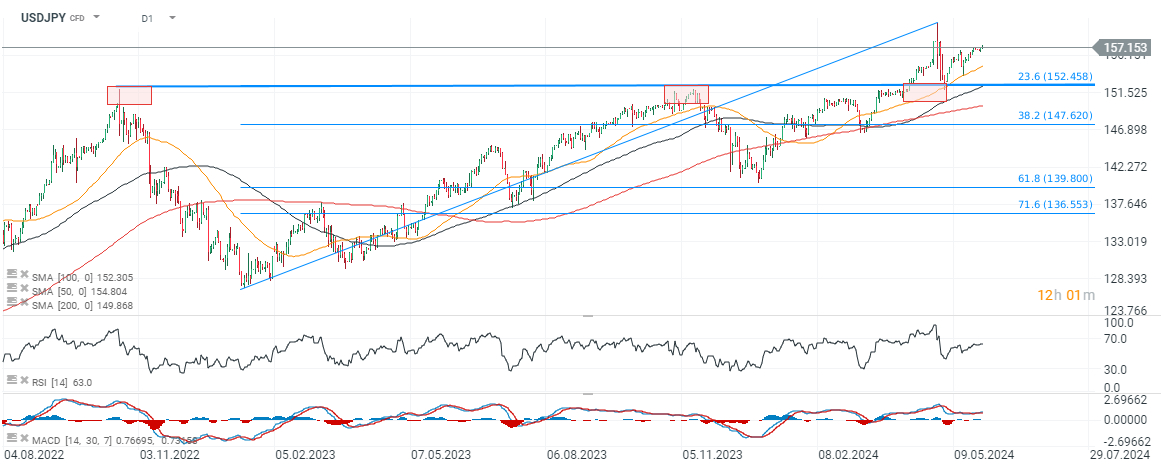The USDJPY pair has risen since yesterday from around 156.9 to 157.2 today, following comments from the Bank of Japan's Adachi, who, while suggesting that the bank is open to the 'risk' of further growth in the economy putting inflationary pressures, did not sound hawkish. Japan's consumer confidence index, however, came in at 36.2 in May, compared to 38.3 previously and 39.5 forecasts for improvement. Much lower than the expected 39.5.
Adachi of the Bank of Japan also suggested that the yen's depreciation could put pressure on the BoJ to change its policy, and that the bank would at some point reduce its JGB purchases. However, the market received weaker data from Japan's economy today, and comments from BoJ bankers tend to point to action in the future, while investors and the currency market are living 'today' with regard to the yen. A significant change in monetary policy is still not on the horizon, with Adachi signalling that the bank will 'patiently' wait until inflation rises to 2%. The Japanese Yen fallen today to its lowest level against the U.S. Dollar since the BoJ intervention, in April.
BoJ's Adachi
- It is desirable to reduce bond-buying policy, given market conditions including liquidity, supply and demand
- The Bank of Japan will reduce JGB purchases at some stage in the future. If inflation moves toward 2%
- The Bank needs to keep a close eye on risks to the economy, which are currently pointing in both sides
- Adachi pointed out the risk of a dynamic 'delayed' rate hike, at a time when the BoJ is still setting interest rates near zero until inflation permanently reaches the BoJ's target
- The BoJ should not focus only on the risk of a slowing economy, as inflation could accelerate as a result, forcing the bank to respond rapidly
- The bank should avoid raising rates prematurely; it should maintain an accommodative policy and wait until inflation reaches the 2% target
- According to Adachi, Japan's economy still grapples with a number of risks and uncertainties; further rebound of the economy is uncertain, while only moderate recovery is observed
- Private consumption remains flat, although stronger demand in the service sector is evident
Of significance is the fact that, according to Adachi, an overly weak yen could amplify inflation, which will ultimately be met with a response from the Bank of Japan. However, it is not at all clear that this would strengthen the market exchange rate of the yen (and put pressure on USDJPY), as Adachi assessed that such a scenario could plunge the country's economy into recession, caused by a shocking change in monetary conditions.
USDJPY (D1 interval)
An important support level for USDJPY remains at 152.5, which is supported by the 23.6 Fibonacci retracement of the 2023 upward wave and previous price reactions. Key resistance runs around 160, where strong supply was previously triggered.

Source: xStation5

Daily summary: Weak US data drags markets down, precious metals under pressure again!

BREAKING: US RETAIL SALES BELOW EXPECTATIONS

Politics batter the UK bond market once more, as Starmer remains under pressure

Takaichi’s party wins elections in Japan – a return of debt concerns? 💰✂️
This content has been created by XTB S.A. This service is provided by XTB S.A., with its registered office in Warsaw, at Prosta 67, 00-838 Warsaw, Poland, entered in the register of entrepreneurs of the National Court Register (Krajowy Rejestr Sądowy) conducted by District Court for the Capital City of Warsaw, XII Commercial Division of the National Court Register under KRS number 0000217580, REGON number 015803782 and Tax Identification Number (NIP) 527-24-43-955, with the fully paid up share capital in the amount of PLN 5.869.181,75. XTB S.A. conducts brokerage activities on the basis of the license granted by Polish Securities and Exchange Commission on 8th November 2005 No. DDM-M-4021-57-1/2005 and is supervised by Polish Supervision Authority.


